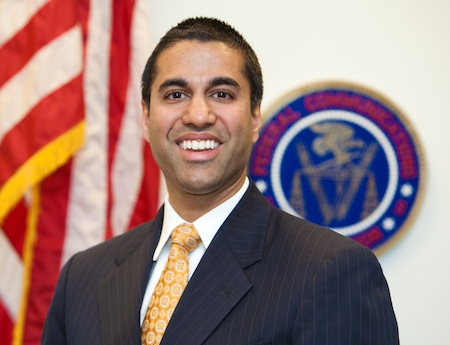FCC's Pai: Title II Foes Need to Pitch Public

The smarter way to stay on top of broadcasting and cable industry. Sign up below
You are now subscribed
Your newsletter sign-up was successful
FCC commissioner Ajit Pai says those opposing FCC classification of the Internet under modified common carrier regs, which include cable and telecom companies, are not making their case well enough.
"I don't believe that opponents of Title II regulation have been doing a good job getting our message out," he said at a Free State Foundation event in Washington Wednesday. "If that doesn't change, I am very worried about the future of America's digital economy."
He suggested that Title II critics need to adopt a different strategy mirroring that of their opponents.
"Talking to each other inside the Beltway isn't going to get the job done," he said. He said they needed to take their message directly to the public instead, as advocates of Title II have done. "I certainly don't agree with their message, [but] they have framed it in a way that is resonating with many Americans."
He said Title II opponents must follow suit.
Pai clearly thinks Title II critics—he is one of them—have a message that should resonate. Much of his speech was making the case against Title II as a heavy-handed regulation geared to controlling one company [AT&T] that had a monopoly on long-distance telephone service, "not the 1,712 companies that now compete to provide broadband service to the American consumer."
"Competition, not preemptive regulation, is the best guarantor of consumer welfare," he said. "The convention of pitting the market against the consumer is as lazy as it is inaccurate."
The smarter way to stay on top of broadcasting and cable industry. Sign up below
Pai also found it "curious" that Title II advocates were arguing that the FCC must "fundamentally change" how the Internet is regulated to in order to maintain the status quo. "It seems to me that if we don't want the Internet to fundamentally change, then we shouldn't fundamentally change our regulatory model."
But rather than talking to each other, he said, Title II opponents need to make their case to "those who rely on high-speed broadband to make a living, educate their kids, or see a doctor."
Make that case, he said, and Title II can be avoided.
Contributing editor John Eggerton has been an editor and/or writer on media regulation, legislation and policy for over four decades, including covering the FCC, FTC, Congress, the major media trade associations, and the federal courts. In addition to Multichannel News and Broadcasting + Cable, his work has appeared in Radio World, TV Technology, TV Fax, This Week in Consumer Electronics, Variety and the Encyclopedia Britannica.

